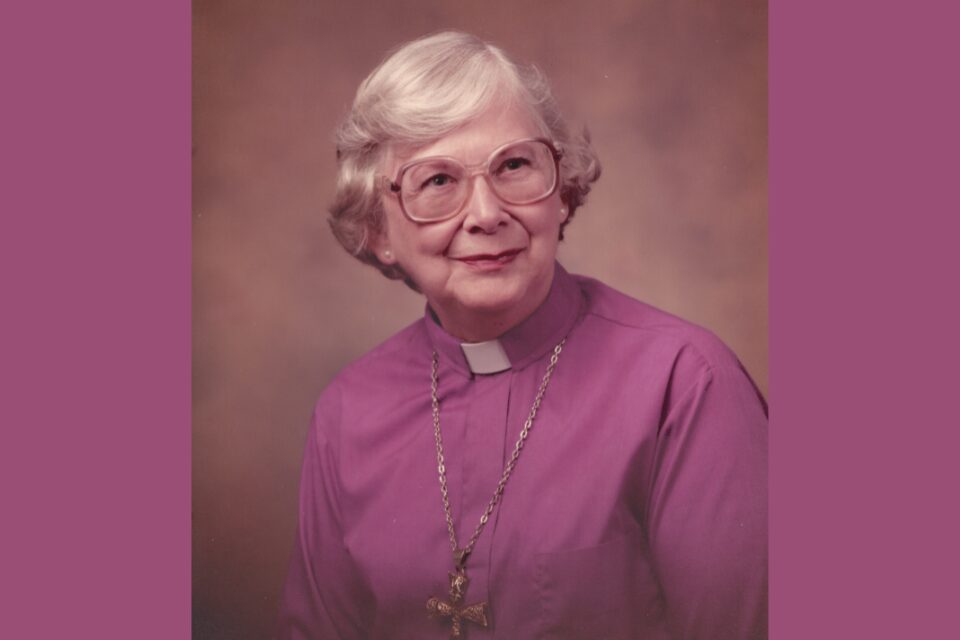Elected in 1980, Majorie Matthews, The United Methodist Church’s first woman bishop, was a Michigander. The New York Times called Matthews “a symbol of progress,” and others lauded her historic episcopacy election as “a new spring that would stream out into a great river of history.”
CRYSTAL CAVINESS
United Methodist Communications
It was 1959, and Marjorie Swank Matthews, a lifelong Methodist, was a single mom working for a Michigan auto parts manufacturer. She was 42, and she felt a call to ministry.
Over the next 25 years, Matthews would follow her call to become a leader within the denomination. When she was elected in 1980 as the first female bishop in The United Methodist Church — and within any mainline Protestant denomination in the world — her election was heralded as momentous. The New York Times called Matthews “a symbol of progress” that women had made across all Protestant denominations.
From Manufacturing to Ministry
Matthews was born on July 11, 1916, in Onawa, MI. Marrying at a young age, she and her family lived on Army posts during World War II. When she divorced after the war, she went to work at Lobdell-Emery Manufacturing Company in Alma, MI, to support herself and her young son, William. While at Lobdell-Emery, she was promoted to assistant to the president and assistant treasurer during her 17 years with the company.
Although her career was going well, Matthews felt led to make a change.
“I thought there must be something else to do with my life,” she was quoted as saying. “I was grateful to God for having gotten me through difficulty and I wanted to do something in return.”
Throughout the next two decades, Matthews pursued her ministry call. She was ordained as an elder in 1965 at age 49. She graduated summa cum laude at age 51 from Central Michigan University. She earned a bachelor of divinity degree from Colgate Rochester Divinity School in upstate New York and then earned a master’s degree in religion and a doctorate in humanities from Florida State University. Throughout these years, Matthews served small congregations in Michigan, New York, and Florida.
As her pastoral experience increased, Matthews was appointed to larger churches and, eventually, was selected in 1976 to serve as district superintendent. At the time, she was only the second woman in the denomination to attain that role. (Margaret Henrichsen was the first woman district superintendent, appointed in 1967.)
‘Gushing Up of a New Spring’
In July 1980, the North Central Jurisdiction met for its annual conference, representing Illinois, Indiana, Iowa, Michigan, Minnesota, North Dakota, Ohio, South Dakota, and Wisconsin. Of the 460 delegates, 23 were female clergy. At the conference, 13 delegates, including Matthews, were running for three bishop seats. On July 17, on the thirtieth ballot, Matthews was one of two bishops elected.
In her book, The Leading Women: Stories of the First Women Bishops of the United Methodist Church, Bishop Judith Craig described the joy in the room as Matthews was escorted to the platform following her election to the episcopacy.
“She stood before us, so small in stature, yet so huge in presence,” Craig wrote. “The moment was like the gushing up of a new spring that would stream out into a great river of history.”
Matthews was assigned to the Wisconsin Conference, where she was bishop for more than 135,000 United Methodists, eight district superintendents, 339 ministers, and 522 congregations.
The historic election brought mixed reactions from those within the church.
“There are several people, I think, who have never reconciled to the fact that there is a woman bishop or that that is a possibility,” Matthews said in a video from the General Board of Higher Education and Ministry. “I hear from those people occasionally, especially when I say something that they don’t like or I’m quoted in the paper as saying something they don’t like. I believe they are entitled to their opinion.”
God Calls the Willing
“However,” she shared, “I firmly believe that God calls both men and women and calls even children into the work of the church. God is more interested in persons who are willing to be used in the ministry or in the work of the church than, I think, that [God] is in the sex of the person.”
Matthews served the Wisconsin Conference for four years before she retired in 1984. She died from breast cancer on June 30, 1986, at age 69.
Last Updated on March 25, 2024

